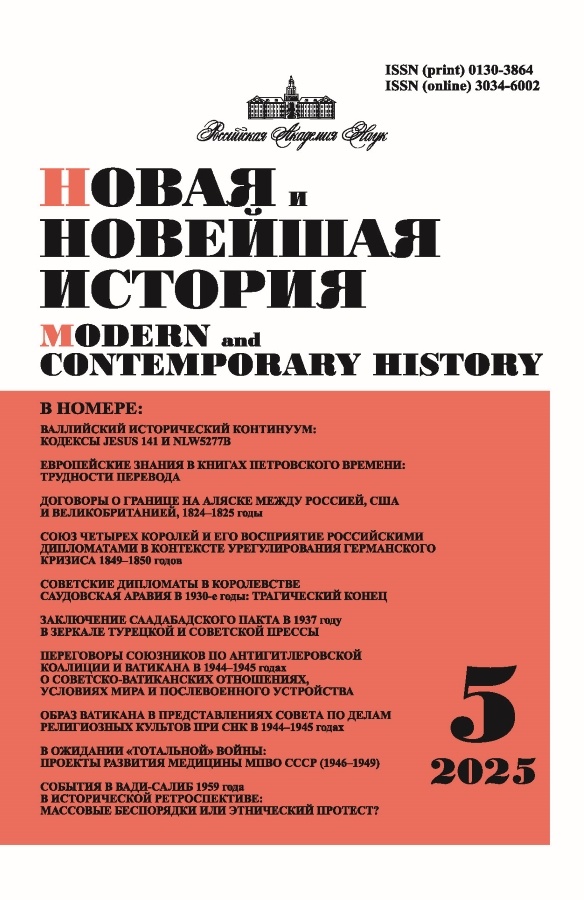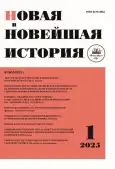Режим Муссолини: концепция консенсуса в зарубежной историографии XXI века
- Авторы: Белоусов Л.С.1, Байбакова Л.В.1
-
Учреждения:
- Московский государственный университет им. М.В. Ломоносова
- Выпуск: № 1 (2025)
- Страницы: 5-22
- Раздел: Теория и методология истории
- URL: https://gynecology.orscience.ru/0130-3864/article/view/679436
- DOI: https://doi.org/10.31857/S0130386425010018
- ID: 679436
Цитировать
Полный текст
Аннотация
В продолжение статьи, опубликованной в № 6 за 2024 г., рассматривается развитие проблемы консенсуса в итальянском обществе в годы режима Муссолини в итальянской и англоязычной историографии в XXI в. Авторы выделяют характерные черты трех основных итальянских историографических школ: сторонников «прогрессивно-демократического» блока (П. Корнер, П. Каннистраро, М.Э. Хаметц, Э. Джентиле), ревизионистов (т.е. наследников Р. Де Феличе: П. Бернхард, К. Дагган, К. Феррис, М. Эбнер, Л. Ла Ровере) и постревизионистов (Р. Пергер, Дж. Альбанезе, А. Кальоти, А. Гальярди, Ф. Кордова). Изучена острая полемика между представителями противоборствующих школ (Корнер vs Бернхард). Споры вновь разгорелись вокруг выводов об ответственности итальянского народа за длительное господство режима Муссолини, характера, содержания и периода консенсуса. Активное включение в дискуссию англоязычных авторов было отчасти основано на новых источниках и методах исследования, позволивших выявить не изученные должным образом компоненты консенсуса в ежедневной жизни, кинематографе, среди женщин, студентов, ученых и крупных предпринимателей. Расширение дискуссии на уровень локальной истории углубило раскол в итальянской историографии в оценке взаимодействия фашистского режима с массами и степени его проникновения в общество. Авторы отмечают как достоинства, так и методические и методологические изъяны в работах представителей всех историографических школ.
Полный текст
Об авторах
Лев Сергеевич Белоусов
Московский государственный университет им. М.В. Ломоносова
Email: lbelousov@olympicuniversity.ru
ORCID iD: 0000-0002-0567-3912
Scopus Author ID: 57198303575
ResearcherId: Y-8445-2018
доктор исторических наук, профессор, академик Российской академии образования, и.о. декана исторического факультета, заведующий кафедрой новой и новейшей истории стран Европы и Америки исторического факультета МГУ
Россия, МоскваЛариса Вилоровна Байбакова
Московский государственный университет им. М.В. Ломоносова
Автор, ответственный за переписку.
Email: lbaibakova@yandex.ru
ORCID iD: 0000-0002-9433-0478
Scopus Author ID: 57237986400
доктор исторических наук, профессор кафедры новой и новейшей истории стран Европы и Америки исторического факультета
Россия, МоскваСписок литературы
- Белоусов Л.С. Режим Муссолини и массы. М., 2000.
- Белоусов Л.С. Режим Муссолини: концепция консенсуса в современной историографии // Новая и новейшая история. 2024. № 6. С. 5–20. doi: 10.31857/S0130386424060017
- Джентиле Э. Политические религии. Между демократией и тоталитаризмом. СПб., 2021.
- Джентиле Э. Фашизм. История и истолкование. СПб., 2022.
- Пергер Р., Альбанезе Дж. Из истории исследований итальянского фашизма и германского нацизма: режим, общество и проблема согласия // Берегиня 777 Сова. 2016. № 4 (31). С. 72–87.
- Филатов Г.С. Крах итальянского фашизма. М., 1973.
- Belousov L.S. Rezhim Mussolini i massy [Mussolini's regime and the masses]. Moskva, 2000. (In Russ.)
- Belousov L.S. Rezhim Mussolini: koncepciya konsensusa v sovremennoj istoriografii [Mussolini’s Regime: the Concept of Consensus in Modern Historiography] // Novaya i Novejshaya Istoriya [Modern and Contemporary History]. 2024. № 6. S. 5–20. DOI: https://doi.org/10.31857/s0130386424060017 (In Russ.)
- Dzhentile E. Fashizm. Istoriya i istolkovanie [Fascism. History and interpretation]. Sankt-Peterburg, 2022. (In Russ.)
- Dzhentile E. Politicheskie religii. Mezhdu demokratiej i totalitarizmom [Political religions. Between democracy and totalitarianism]. Sankt-Peterburg, 2021. (In Russ.)
- Filatov G.S. Krakh ital’yanskogo fashizma [The collapse of Italian fascism]. Moskva, 1973. (In Russ.)
- Bernhard P. Renarrating Italian Fascism: New Directions in the Historiography of a European Dictatorship // Contemporary European History. 2014. № 23 (1). P. 151–163.
- Caglioti A.M. Scienza e società fascista: il caso della meteorologia // Il fascismo italiano. Storia e interpretazioni / a cura di G. Albanese. Roma, 2021. P. 166. P. 161–186.
- Cannistraro P.V. La fabbrica del consenso. Fascismo e mass media. Milano, 2022.
- Cordova F. Il consenso imperfetto: quattro capitoli sul fascismo. Soveria Mannelli, 2010.
- Cordova F. Le origini dei sindacati fascisti. Roma; Bari, 1974.
- Corner P. Italia Fascista. Politica e opinione popolare sotto la dittatura. Roma, 2015.
- Corner P. L’opinione popolare nell’Italia fascista degli anni Trenta // Il consenso totalitario. Opinione pubblica e opinione popolare sotto il fascismo, nazismo e comunismo / a cura di P. Corner. Roma; Bari, 2012. P. 127–155.
- Corner P. La dittatura fascista. Consenso e controllo durante il Ventennio. Roma, 2017.
- Corner P. The Party and the People: Totalitarian States and Popular Opinion // Contemporary European History. 2015. № 24 (2). P. 303–308.
- Duggan C. Fascist Voices: An Intimate History of Mussolini’s Italy. London, 2012.
- Duggan C. Il popolo del duce. Storia emotiva dell’Italia fascista. Roma; Bari, 2012.
- Ebner M.R. Ordinary Violence in Mussolini’s Italy.Cambridge, 2011.
- Ferris K. Everyday Life in Fascist Venice, 1929–1940. Basingstoke, 2012.
- Gagliardi A. “Educare” o intrattenere? Propaganda, mass media e cultura di massa // Il fascismo italiano. Storia e interpretazioni / a cura di G. Albanese. Roma, 2021. P. 255–279.
- Gentile E. Il duce, che emozione! // Il Sole 24 Ore. 4.V.2014.
- Gentile E. Mussolini contro Lenin. Roma; Bari, 2017.
- Hametz M. In the Name of Italy: Nation, Family and Patriotism in a Fascist Court. New York, 2012.
- La Rovere L. Storia dei GUF. Organizzazione, politica e miti della gioventù universitaria fascista 1919–1943. Torino, 2003.
- Leone M. Il fascismo e l’universo femminile. Verona, 2017.
- Macciocchi M.A. La donna nera. Milano, 1976.
- Pergher R. The Ethics of Consent-Regime and People in the Histroriographies of fascist Italy and Nazu Germany // Contemporary European History. 2015. № 24 (2). P. 309–315.
Дополнительные файлы








